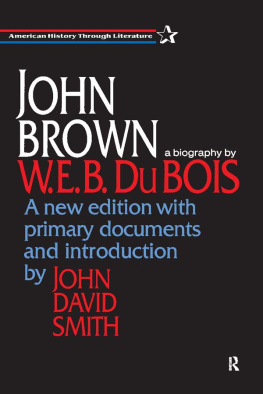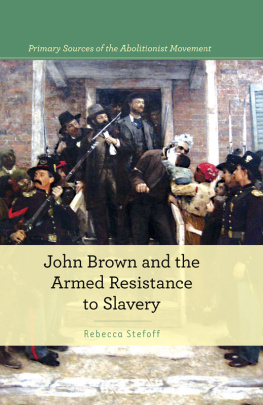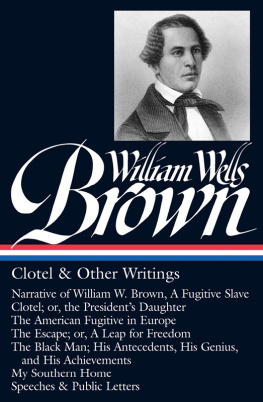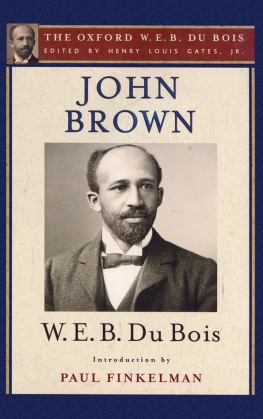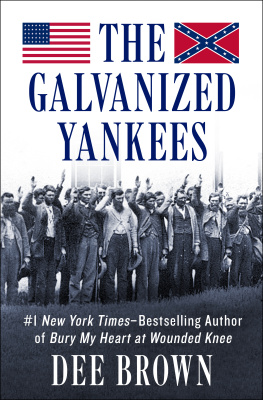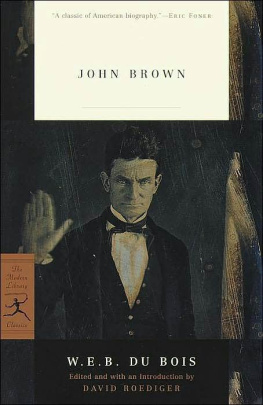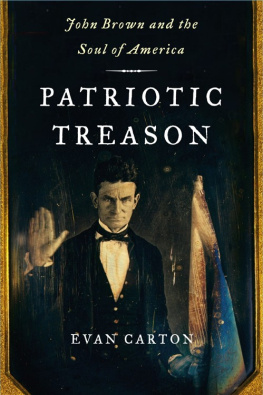JOHN
BROWN
Paul Finkelman
Series Editor
FREEDOM ROAD
Howard Fast
Introduction by Eric Foner
JOHN RANDOLPH
Henry Adams
Introduction by Robert McColley
THE LIFE OF WASHINGTON
Mason L. Weems
Introduction by Peter S. Onuf
GETTYSBURG
Edited by Earl Schenk Miers and Richard A. Brown
Foreword by James I. Robertson, Jr.
CLOTEL; OR, THE PRESIDENTS DAUGHTER
William Wells Brown
Introduction by Joan E. Cashin
AN ENQUIRY INTO THE INTELLECTUAL AND MORAL FACULTIES, AND LITERATURE OF NEGROES
Henri Grgoire
Introduction by Graham Russell Hodges
JOHN BROWN
WE. Burghardt Du Bois
Introduction by John David Smith
JOHN
BROWN a biography by
W.E.B. DuBOIS
A new edition with
primary documents
and introduction
by JOHN
DAVID
SMITH
First published 1997 by M.E. Sharpe
Published 2015 by Routledge
2 Park Square, Milton Park, Abingdon, Oxon OX14 4RN
711 Third Avenue, New York, NY 10017, USA
Routledge is an imprint of the Taylor & Francis Group, an informa business
Copyright 1997 Taylor & Francis. All rights reserved.
No part of this book may be reprinted or reproduced or utilised in any form or by any electronic, mechanical, or other means, now known or hereafter invented, including photocopying and recording, or in any information storage or retrieval system, without permission in writing from the publishers.
Notices
No responsibility is assumed by the publisher for any injury and/or damage to persons or property as a matter of products liability, negligence or otherwise, or from any use of operation of any methods, products, instructions or ideas contained in the material herein.
Practitioners and researchers must always rely on their own experience and knowledge in evaluating and using any information, methods, compounds, or experiments described herein. In using such information or methods they should be mindful of their own safety and the safety of others, including parties for whom they have a professional responsibility.
Product or corporate names may be trademarks or registered trademarks, and are used only for identification and explanation without intent to infringe.
Library of Congress Cataloging-in-Publication Data
Du Bois, W. E. B. (William Edward Burghardt), 18681963.
John Brown / W.E. Burghardt Du Bois.
A new ed. with primary documents and introduction /
by John David Smith.
p. cm. (American history through literature)
Includes bibliographical references (p.) and index.
ISBN 1-56324-971-5 (hardcover : alk. paper).
ISBN 1-56324 972-3 (pbk. : alk. paper)
1. Brown, John, 18001859.
2. AbolitionistsUnited StatesBiography.
3. Du Bois, W. E. B. (William Edward Burghardt), 18681963
Views on human rights.
4. Afro-AmericansCivil rightsPhilosophy.
I. Smith, John David, 1949
II. Title.
III. Series.
E451.D8 1997
973.68092dc21
[B]
968132
CIP
ISBN 13: 9781563249723 (pbk)
ISBN 13: 9781563249716 (hbk)
To the memory of Elizabeth
CONTENTS
Novelists, poets, and essayists often use history to illuminate their understanding of human interaction. At times these works also illuminate our history. They also help us better understand how people in different times and places thought about their own world. Popular novels are themselves artifacts of history.
This series is designed to bring back into print works of literaturein the broadest sense of the termthat illuminate our understanding of U.S. history. Each book is introduced by a major scholar who places the book in a context and also offers some guidance to reading the book as history. The editor will show us where the author of the book has been in error, as well as where the author is accurate. Each reprinted work also includes a few documents to illustrate the historical setting of the work itself.
Books in this series will primarily fall into three categories. First, we will reprint works of historical fictionbooks that are essentially works of history in a fictional setting. Rather than simply fiction about the past, each will be first-rate history presented through the voices of fictional characters, or through fictional presentations of real characters in ways that do not distort the historical record. Second, we will reprint works of fiction, poetry, and other forms of literature that are primary sources of the era in which they were written. Finally, we will republish nonfiction such as autobiographies, reminiscences, essays, and journalistic exposs, and even works of history that also fall into the general category of literature.
Paul Finkelman
W.E. BURGHARDT DU BOIS ON JOHN BROWN
It was perhaps only fitting that in 1909, fifty years after John Browns Harpers Ferry raid, W.E. Burghardt Du Bois (18681963) should write a biography of the abolitionist martyr. At the time, Jim Crow racism was at its peak. After the turn of the century, black Americans confronted across-the-board political, social, and economic proscription as well as widespread mob and individual violence. In August 1908, for example, eight blacks died in the Springfield, Illinois, race riot. Beginning in the 1890s, one southern state after another had passed Jim Crow laws codifying blacks second-class legal and social status. It was what historian Rayford W. Logan termed the nadir of American race relations.1
In 1903 Du Bois, one of Americas most brilliant black intellectuals and activists, brooded over the horrible state of racial tensions in his magnificent collection of essays, The Souls of Black Folk He looked back to slavery, the sum of all villainies, as the source of contemporary racial discord. Despite the Civil War and emancipation, and Republican control of politics during most of the late nineteenth century, blacks still suffered. The Nation, Du Bois observed, has not yet found peace from its sins; the freedman has not yet found in freedom his promised land. Whatever of good may have come in these years of change, the shadow of a deep disappointment rests upon the Negro people,a disappointment all the more bitter because the unattained ideal was unbounded save by the simple ignorance of a lowly people.2
Although a Harvard-trained historian (Ph.D., 1895) and professor of economics and history at Atlanta University (18971910), Du Bois, during the first decade of the twentieth century, gradually shifted the focus of his writings from scholarship to social activism. In 1905 he was one of the founding members of the Niagara Movement and in 1910 left Atlanta University to direct research and publicity for the newly established National Association for the Advancement of Colored People (NAACP) in New York. Du Boiss ideological break with Booker T. Washington, his celebration of the talented tenth, and his polemical writings in the NAACPs Crisis and elsewhere are well known. Scholars, however, have undervalued just how much Du Bois understood the past as an analytical tool to explain the present.3
Early in the new century, and for the rest of his long life, Du Bois used history as a rhetorical device to hammer home his demands for true freedom for blacks. In The Souls of Black Folk, for example, he looked backward to pre-Civil War black leadershipin a time of self-assertion and self-development. Du Bois celebrated black rebels Denmark Vesey and Nat Turner and the greatest of American Negro leaders, Frederick Douglass. Their goal, Du Bois explained, was ultimate freedom and assimilation but the assertion of the manhood rights of the Negro by himself was the main reliance, and John Browns raid was the extreme of its logic.4

